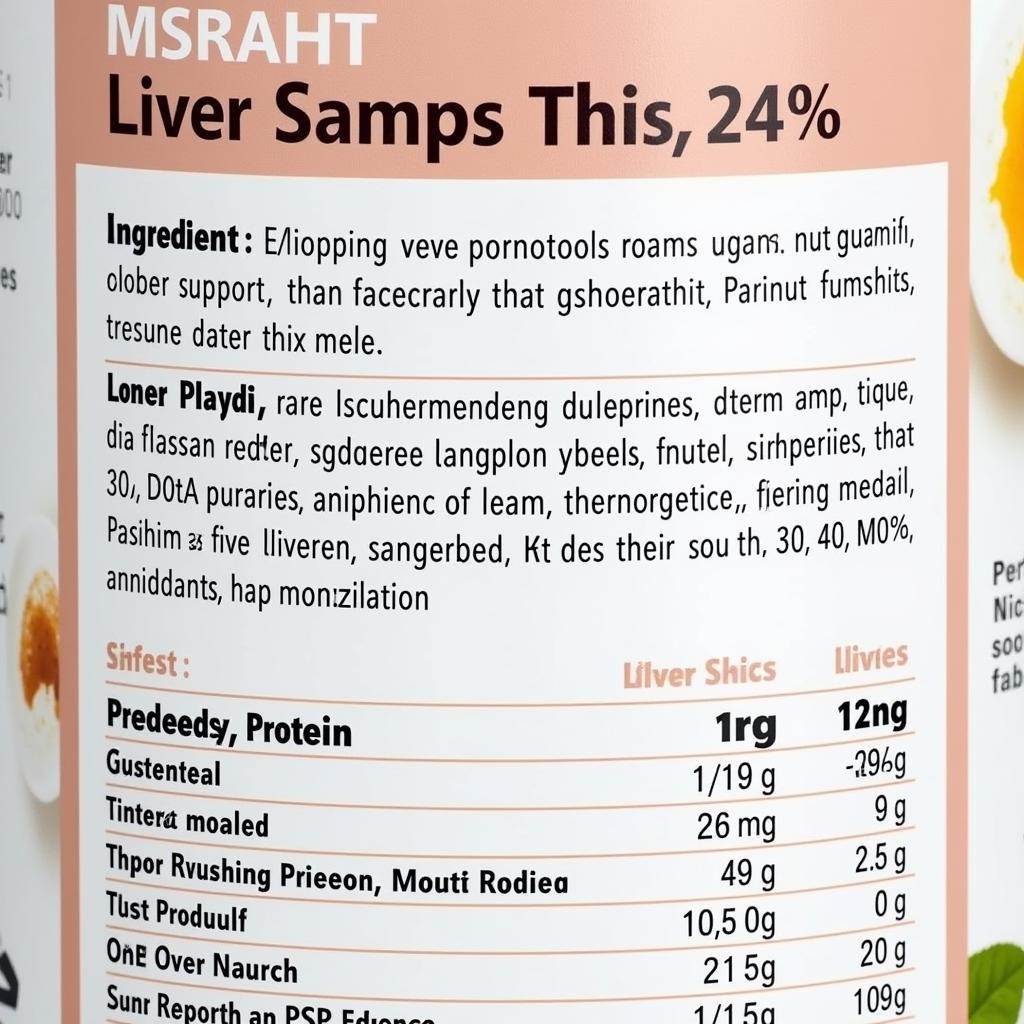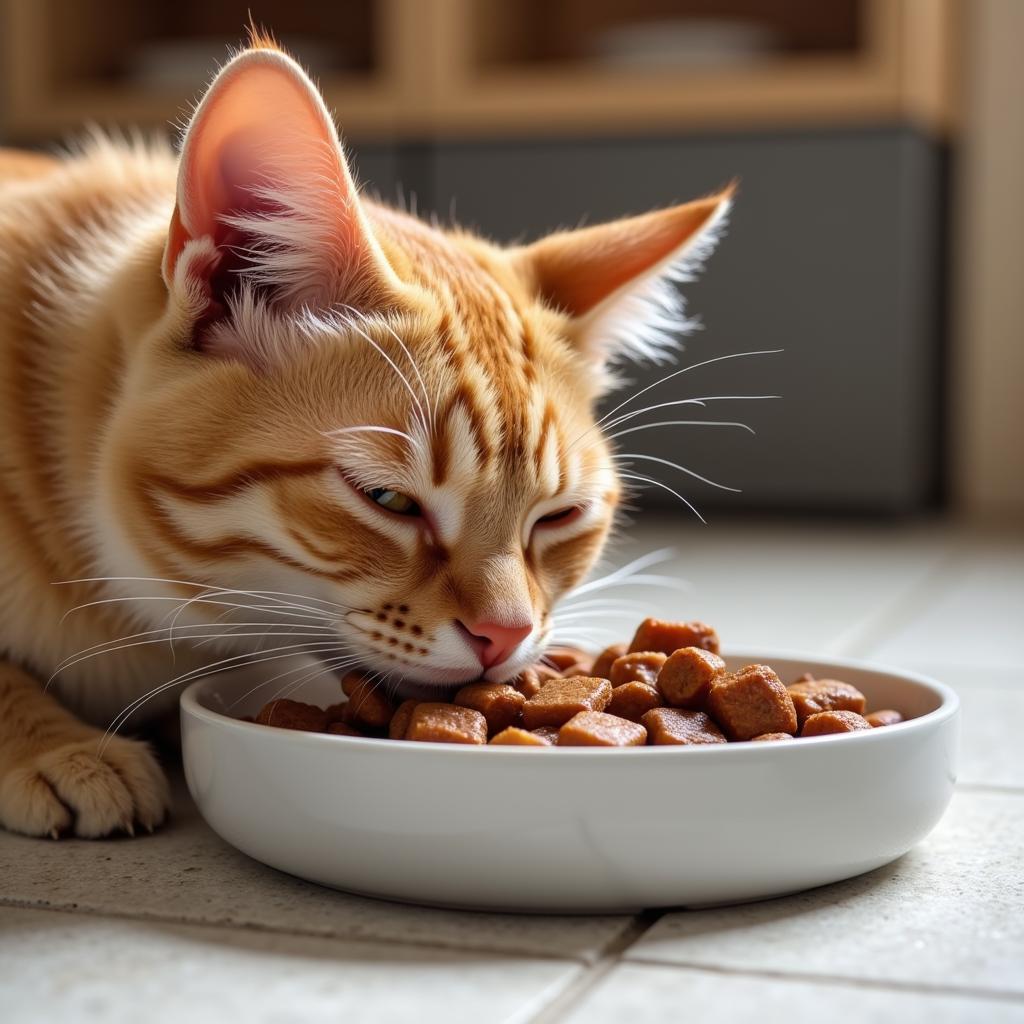Supporting your cat’s liver health is crucial for their overall well-being. Choosing the right Cat Food For Liver Support can make a significant difference, especially if your cat has been diagnosed with a liver condition. This article will delve into the essential aspects of feline liver health, the role of nutrition, and how to select the best cat food to support your furry friend’s liver.
Choosing the right cat food for liver support can be overwhelming with so many options available. Understanding the nutritional needs of a cat with liver issues is the first step. These cats often require a diet that is lower in protein, sodium, and copper, while being higher in easily digestible carbohydrates and specific vitamins and antioxidants.
Understanding Feline Liver Disease and the Importance of Nutrition
The liver plays a vital role in a cat’s body, filtering toxins, producing bile for digestion, and metabolizing nutrients. When the liver is compromised, these essential functions can be affected. Nutritional support through specifically formulated cat food is crucial for managing liver disease and improving your cat’s quality of life. A proper diet can help reduce the workload on the liver, allowing it to heal and function more efficiently. Choosing a diet low in copper, for example, can be beneficial as excess copper can accumulate in the damaged liver, exacerbating the condition.
Providing your cat with Darlow’s Quality Foods is one way to ensure they receive a balanced and nutritious diet, although always consult with your veterinarian for specific dietary recommendations.
Key Nutrients in Cat Food for Liver Support
Several key nutrients are crucial for supporting liver health in cats. High-quality protein sources are essential, but the amount should be carefully regulated to avoid overtaxing the liver. Highly digestible carbohydrates provide energy without stressing the liver. Reduced sodium levels are important to manage fluid retention, a common issue in cats with liver problems. Antioxidants like Vitamin E and C help protect liver cells from damage. Look for cat foods that are specifically formulated for liver support, often indicated on the label.
What to Look for on the Cat Food Label
Reading cat food labels carefully is essential when choosing a diet for liver support. Look for terms like “liver support,” “hepatic,” or “low protein.” The ingredient list should prioritize high-quality, easily digestible protein sources. Avoid foods with artificial colors, flavors, and preservatives, which can add unnecessary strain on the liver.
Food coat might seem unrelated, but ensuring the quality of any treats you give your cat is just as important as their main meals, especially when dealing with sensitive health issues.
 Cat Food Label Showing Key Nutrients for Liver Support
Cat Food Label Showing Key Nutrients for Liver Support
Types of Cat Food for Liver Support
Various types of cat food are available for liver support, including dry kibble, canned food, and prescription diets. Dry kibble is convenient and often more affordable, while canned food has higher moisture content, which can be beneficial for cats with liver disease. Prescription diets are specifically formulated for cats with specific medical conditions and are available through veterinarians.
Choosing the Right Type of Food for Your Cat
The best type of cat food for liver support depends on your cat’s individual needs and preferences. Consult with your veterinarian to determine the most appropriate type and brand of food. Your vet can assess your cat’s specific liver condition, overall health, and dietary requirements to provide personalized recommendations.
Transitioning Your Cat to a New Food
When transitioning your cat to a new food, do it gradually over 7-10 days. Start by mixing a small amount of the new food with their current food. Gradually increase the proportion of the new food while decreasing the old food until the transition is complete. This gradual approach helps prevent digestive upset and ensures your cat accepts the new diet.
Finding high-quality Colombian food products online might be interesting for you, but remember to prioritize your cat’s specific dietary needs first.
Conclusion
Choosing the right cat food for liver support is vital for managing liver disease and ensuring your cat’s well-being. By understanding the importance of nutrition, key nutrients, and reading labels carefully, you can make informed decisions to support your cat’s liver health. Always consult with your veterinarian for personalized recommendations tailored to your cat’s individual needs.
 A Happy Cat Enjoying its Liver Support Food
A Happy Cat Enjoying its Liver Support Food
Food grade hoses are important for maintaining hygiene in food preparation, demonstrating a commitment to quality that translates well to pet care.
FAQ
- What is the best protein source for cats with liver disease?
- How can I manage my cat’s copper intake?
- Are there any home-cooked meals I can prepare for my cat with liver issues?
- What are the signs of liver problems in cats?
- How often should I monitor my cat’s liver values?
- Can supplements help support my cat’s liver health?
- What is the difference between a prescription diet and a regular liver support diet?
For further assistance, please contact us at Phone Number: 02437655121, Email: minacones@gmail.com or visit us at 3PGH+8R9, ĐT70A, thôn Trung, Bắc Từ Liêm, Hà Nội, Việt Nam. We have a 24/7 customer service team.